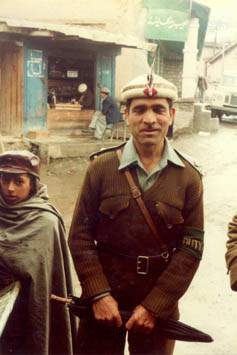
When I was getting married in Moroy, Chitral in 1978, Ayub came to the marriage ceremony because he was a neighbor living next door. He also spoke English well. I was surprised that a man in a remote place like Moroy could speak English at all.
Ayub asked me a lot of questions about Islam, probing my knowledge of the subject. I apparently passed his tests, because he gave his agreement for the marriage to proceed.
 |
It should not really be much of a surprise that I passed Ayub's tests, because I had studied Islam thoroughly and knew it better than most. Also, I had not long before escaped from jail in Afghanistan (I did not tell Ayub that) and the top religious leaders in Afghanistan had been my cellmates in jail, so during the three months I was in with them they gave me a lot of religious education. (Most of them were eventually executed by the Communist Government of Afghanistan).
My marriage in Moroy ultimately failed and I was forced to divorce my wife. In short, her father ultimately would not allow me to take his daughter to America and of course it was useless for me to have a wife who was not with me. I spent one year trying to reconcile the situation. I left Pakistan in October, 1978 and went back to America. I returned to Pakistan one year later and when my father-in-law still would not allow me to take my wife, I gave up and divorced her. I then returned to America again, but not before visiting the Kalash Valleys and meeting some of the ladies there, including one named Afiyat and one named Sunik.
In America, in November 1979, I received a letter from a cousin of Sunik saying that Sunik wanted me to marry her. I did not return right away, as there was some turmoil in my life in America.
Finally, in January, 1980, I borrowed four thousand dollars ($4,000) from my friend Richard Reynolds, a floor broker on the American Stock Exchange, and I returned to Pakistan. However, it was impossible for me to book a flight from Peshawar to Chitral and the roads were closed as they always are during the winter because of the snow on Lowari Top, which is 10,200 feet high and is the only entrance to Chitral.
Since the snow would not melt and the road would not open until May 20, I decided to cross by foot. I crossed Lowari Top on February 3, 1980.
I did not realize it at the time, but I crossed at the most dangerous time of the year. In February, the snow starts to melt and there are often avalanches, frequently resulting in the loss of human life. Only three days after I crossed Lowari Top, three men were killed by an avalanche there.
When I arrived in the Kalash Valleys, I was informed of the bad news, which was that eight days prior to my arrival Sunik had been married by force by her father to another man. Sunik had argued valiantly with her father about this. She had said that she wanted to be married to Ismail, who was coming. Finally, she had agreed to a date. She promised her father that if Ismail did not arrive by a certain date, she would be married to the man he selected.
The date came and her father, a rough and course man, dragged Sunik off to the house of that man, who was a common laborer.
When I arrived on the scene eight days later, I protested to no avail. Finally, I went to Chitral and then to Drosh, where I met Ayub Subidar who was stationed there. This was a great coincidence, as Drosh is 60 miles from Moroy where he lives.
I explained my situation to Ayub and we were walking down the road when we met Aziz. Aziz invited us into his house. My Khowar language was not yet very fluent and I could not follow what they were saying, but after 30 minutes of conversation, Ayub turned to me and said that Aziz had agreed to marry me to his cousin, whose name was Honzagool.
One week later, the marriage ceremony was held in the village of Damik, which is three miles from Drosh. However, there was a dispute between Aziz and Ayub. Aziz and most of the other guests at the marriage party wanted a party with the playing of drums and other musical instruments plus singing and chanting. Ayub strenuously opposed this as being un-Islamic and said that a marriage ceremony should be a solemn occasion.
This was a serious dispute. Even years later both men expressed anger at the other because of this incident.
Ayub played an important role in my marriage to Honzagool. All of Chitral knew that I had been married and later divorced in Moroy, because I was the first foreigner in history ever to be married in Chitral. A lot of questions were asked about this at the marriage party in Damik. Ayub said he knew all about the situation in Moroy and that it was entirely the fault of the father and brothers of my wife there that the marriage had ended in divorce.
Had Ayub not vouched for me, the marriage ceremony to Honzagool would probably have been called off, especially since one of the uncles of Honzagool, Dinar Khan, was opposed to the marriage.
As a result, I am deeply indebted to Ayub for his help. Unfortunately, I believe that he has received much criticism for his role in these matters.
Ismail Sloan
For other photos see: